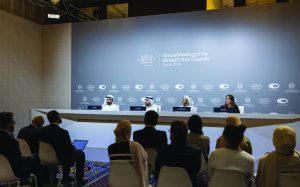DUBAI / WAM
The UAE Centre for the Fourth Industrial Revolution (UAE C4IR), overseen by the Dubai Future Foundation (DFF), on Thursday launched a report designed to help creative industries navigate the vast opportunities and challenges posed by artificial intelligence (AI).
The report, Artificial Intelligence in Creative Industries: Guidelines for Development, Regulation and Use, was launched at the 2024 Annual Meeting of the Global Future Councils, a joint venture by the World Economic Forum (WEF) and the UAE Government. The meeting of the 30 councils, featuring some 500 experts from 80 countries, provided the ideal opportunity to launch a report supporting one of the pillars of knowledge-based economies. Some of the report’s findings will be put forward as recommendations to help set the agenda of the next WEF Annual Meeting in Davos in January 2025.
Following the launch, a press conference was held highlighting the key findings of the report, the current state of AI in the creative industry, and the recommended way forward.
Expert panellists at the press conference included Abdulaziz Al Jaziri, Deputy CEO at DFF; Dr Saeed Mubarak bin Kharbash, CEO of the Arts and Literature Sector at Dubai Culture Authority; Faisal Kazim, Head of UAE Centre for the Fourth Industrial Revolution; and Benedetta Ghione, Executive Director at Art Dubai.
The report outlines a series of guidelines for the use of AI in creative industries, focusing on transparency, inclusivity, and human-centrism. It assesses the potential impact of AI on creative industries and stakeholders including artists, writers, musicians, developers, and regulators. It explores how AI can empower human creativity rather than compete with it, showcasing case studies such as that of an artist who has embraced a machine learning algorithm able to replicate her brush strokes.
Abdulaziz Al Jaziri, Deputy CEO at DFF, said, “The potent combination of human vision and AI capabilities holds immense promise for creative industries. However, to harness this potential for good, it is critical to create international guidelines to ensure AI-generated outcomes are responsible, inclusive, and unbiased. Not only that, but these guidelines must also ensure transparency and uphold intellectual property rights.”
Al Jaziri added, “We are committed to enhancing Dubai’s position as a global hub for creative industries and knowledge sharing.”
“The Artificial Intelligence in Creative Industries report presents a well-informed, deeply researched outlook on the opportunities for using generative AI to serve the global creative community.”
“This fusion of tech and the human mind has the potential to transform the digital economy. Dubai, as one of the most future-ready cities, with an advanced ecosystem of foresight, opportunity design, and application testing, is the ideal platform for unlocking this potential.”
The report calls for a re-evaluation of how we protect human agency and ensure that creative processes continue to reflect individual expression. Simultaneously, it addresses various ethical, legal, social, and economic challenges arising from the use of generative AI in creative industries, while acknowledging the immense potential it offers.
 The Gulf Time Newspaper One of the finest business newspapers in the UAE brought to you by our professional writers and editors.
The Gulf Time Newspaper One of the finest business newspapers in the UAE brought to you by our professional writers and editors.
